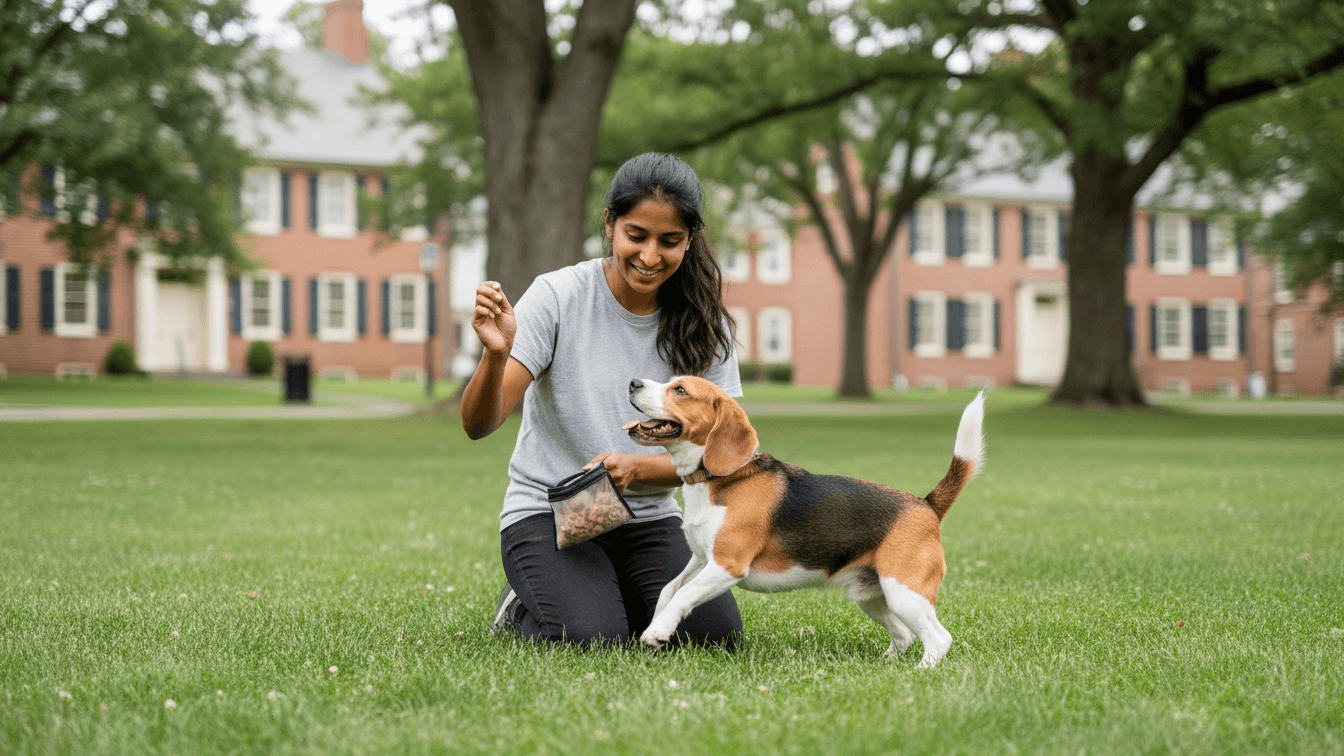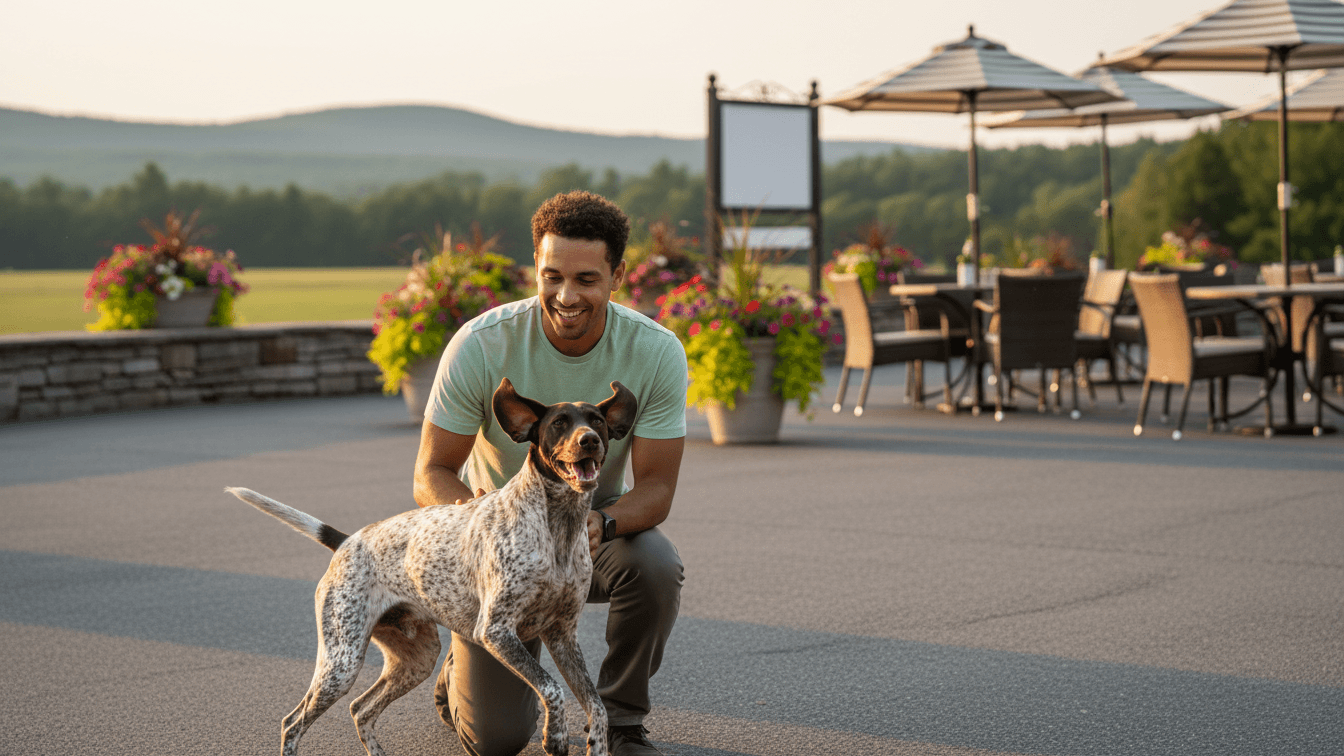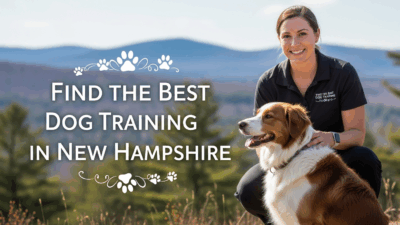Your Complete Guide to Choosing a Dog Trainer in New Hampshire
Finding the right professional dog trainer in New Hampshire means looking for someone who understands the specific challenges of living with a dog in the Granite State. Whether you’re navigating winter trail etiquette, practicing recalls at busy state parks, or working on calm behavior during tourist season in popular areas, your dog needs skills that match your local lifestyle.
New Hampshire doesn’t require special licensing for dog trainers, which means credentials and training methods become your most important screening tools. Look for trainers who use positive reinforcement training and can help you build a well-behaved dog who thrives in New Hampshire’s mix of rural towns, hiking trails, and seasonal visitor crowds.
How to Choose the Right Trainer
Start by identifying what you actually need help with. Puppy training looks very different from behavior modification for reactivity, and a trainer who excels at basic obedience might not be the right fit for aggressive dog training or separation anxiety.
Credentials give you a quick way to compare experience levels. Common dog trainer certifications include CPDT-KA, KPA-CTP, or IAABC-CDBC for serious behavior problems. If your dog shows aggression toward people or other dogs, look for someone with CBCC-KA or a science-based program like CTC.
In-home dog training works great for problems that happen at home, like door manners, jumping on guests, or house training. Group classes make more sense once your dog can focus around other dogs and distractions. Private lessons give you flexibility to work on whatever combination of skills matters most for your daily routine.
Ask about their training program structure upfront. Good trainers should explain how they’ll measure progress, what practice you’ll need to do between training sessions, and when your dog will be ready for more challenging environments like farmers markets, downtown sidewalks, or crowded trailheads.
Common Dog Training Methods Explained

Reward-based methods build trust while creating lasting behavior changes. They’re also much safer for preventing bite incidents, which matters when you’re working around other hikers, neighbors, and wildlife.
Basic obedience covers sit, down, stay, place, recall, and leash training so your dog can handle daily life without pulling you down icy sidewalks or jumping on visitors. These foundation skills make everything else easier.
Puppy classes focus on socialization, potty training, bite inhibition, crate comfort, and early leash skills. Starting young prevents problems from forming in the first place, especially if you live in a neighborhood with noise-sensitive neighbors or plan to bring your puppy to busy public spots.
Behavior modification addresses fear, reactivity, resource guarding, or separation anxiety through careful desensitization and counterconditioning. For serious cases, ask if your trainer works with local veterinarians or veterinary behaviorists.
Private lessons and in-home sessions let you customize everything around your specific challenges. Day training can speed up results when you’re short on time, since the trainer works your dog during the day and then teaches you how to maintain the progress.
Dog training classes help your dog practice good manners around other dogs and people. The best group classes screen participants carefully, give dogs plenty of space, and teach calm focus rather than just excitement.
Specialized training like service dog training or therapy dog training requires extra structure, public-access skills, and very clear step-by-step benchmarks. Not every trainer offers these programs, so ask specifically if that’s what you need.
Board and train programs can work for basic skills, but make sure you understand how the trainer will teach you to maintain the behaviors after your dog comes home. Without strong owner education, results often fade quickly.
Stay away from trainers who use fear, intimidation, or pain to get results. Humane methods are safer for everyone and much better for building the kind of reliable behavior you need on shared trails and in town centers.
Average Cost of Dog Training in New Hampshire (Updated for 2025)
Prices across New Hampshire depend on the trainer’s experience, location, session length, and training format. Rural areas and northern regions tend to cost slightly less than the Seacoast or Manchester metro area.
| Service Type | Average Cost (New Hampshire) |
|---|---|
| Puppy classes (4-6 weeks) | $140-$260 total |
| Group obedience classes (4-6 weeks) | $150-$290 total |
| Private lessons (60-90 min) | $100-$180 per session |
| In-home coaching packages (4-6 visits) | $400-$850 total |
| Day training (trainer works your dog + handoff) | $425-$900 per week |
| Behavior consult for reactivity/anxiety (initial) | $140-$240 |
| Board and train (2-4 weeks) | $1,900-$4,200 total |
You’ll probably pay extra travel fees if you live in more remote areas. Behavior modification for serious aggression or anxiety typically costs more than basic obedience training.
Make sure you understand what’s included, whether the trainer offers a free consultation or free evaluation before you commit, and how they track your dog’s progress over time.
Questions to Ask a Potential Dog Trainer
- What training methods do you use, and how do you keep sessions positive and low-stress?
- What credentials do you have, and do you keep up with continuing education?
- How will you customize the training plan for my dog’s specific needs and our New Hampshire lifestyle?
- Do you offer in-home visits, group classes, or day training, and which approach fits my goals best?
- How will we measure my dog’s progress and know when to add more distractions?
- What are the total costs, including any travel fees, and what’s your cancellation policy?
- Do you carry liability insurance, and can you show me proof?
- For behavior problems, will you work with my veterinarian if needed?
- What should I practice between our sessions to help my dog keep improving?
- Have you worked with dogs who need skills for hiking, off-leash areas, or seasonal tourist crowds?
Local New Hampshire Rules and Considerations
New Hampshire towns set their own leash laws and nuisance rules, so requirements vary depending on where you live. Most municipalities require dogs to be leashed or under direct control in public spaces.
The state requires current rabies vaccination for all dogs, and you’ll need proof of vaccination to get a dog license. You can find details on the New Hampshire Department of Health and Human Services rabies information page.
Dog licensing happens at the town level, and most towns require annual renewal. Fees vary by municipality, but licensing helps reunite lost dogs with their owners and supports local animal control services.
Excessive barking can violate local noise ordinances, so work with your trainer on alert barking and separation anxiety before neighbors start complaining. Many towns also have rules about dogs running at large, which means even well-trained dogs need to come when called or stay on your property.
New Hampshire doesn’t require special licenses or certifications for dog trainers. If a trainer offers board and train services, their facility may need to meet certain standards, but there’s no state oversight board for dog training services specifically.
Always check your town’s specific ordinances, especially if your trainer wants to use public parks for commercial training sessions. Some municipalities require permits and proof of insurance for professional dog trainers working in town spaces.
Local New Hampshire Resources for Dog Owners
These spots give you great places to practice polite manners, work on recalls, and provide safe enrichment for your dog. Always follow posted rules and be prepared to leash your dog if the situation calls for it.
- Pooch Park at Claremont’s Monadnock Park offers a fenced area where you can practice off-leash recalls and socialization in a controlled environment.
- Manchester Dog Park on Harvey Road provides separate areas for small and large dogs, making it easier to practice calm greetings and focus around distractions.
- Portsmouth Dog Park at Wentworth Road gives you a safe space to work on recall and play skills near the Seacoast.
- White Lake State Park in Tamworth welcomes leashed dogs on trails and in picnic areas, perfect for building focus around families, wildlife, and other hikers.
- Pawtuckaway State Park allows leashed dogs on trails and at campsites, giving you excellent opportunities to practice leash manners and calm behavior in busy outdoor settings.
- Franconia Notch State Park permits leashed dogs on many trails, offering varied terrain and distraction levels for training for dogs who need to learn focus around tourists and wildlife.
Many New Hampshire towns also have trails, conservation lands, and town forests where leashed dogs are welcome. Check with your local recreation department for details.

FAQs
How much does in-home dog training cost?
Most New Hampshire trainers charge $100-$180 per in-home visit, with discounts available when you buy packages. Behavior problems and complex issues typically start at the higher end of that range.
Is in-home dog training worth it?
Absolutely, because you’re working on problems exactly where they happen. Your trainer can fix door manners, jumping on guests, counter-surfing, and yard reactivity right at home, then step outside to practice leash skills on your actual neighborhood sidewalks or trails.
Can you pay someone to house train your dog?
Yes, many trainers offer puppy training programs that include potty training, crate routines, and daily schedules. Day training can speed up the process while teaching you how to maintain the progress after the trainer leaves.
What is the 3-3-3 rule for dog training?
This is a helpful timeline for new or adopted dogs: expect about 3 days for your dog to decompress, 3 weeks to learn your routines, and 3 months to feel completely settled. Good training plans work with this natural adjustment period rather than against it.
How long will it take to reach my training goals?
Most puppies and friendly adult dogs show solid progress within 4-8 weeks if you practice daily. Fear, reactivity, or aggression typically requires several months of careful behavior modification with gradual increases in difficulty.
What should I bring to group classes?
Pack a flat collar or harness, a 6-foot leash, high-value treats, water, and current vaccination records if your trainer requests them. Leave retractable leashes at home for safety reasons.
What’s the leash law in New Hampshire?
Leash laws vary by town, but most municipalities require dogs to be leashed or under direct control in public spaces. Some towns have stricter rules than others, so check your local ordinances before assuming your dog can be off-leash anywhere.
Do I need a dog license in New Hampshire?
Yes, most New Hampshire towns require annual dog licenses. You’ll need proof of current rabies vaccination to get a license, and fees vary by municipality. Contact your town clerk’s office for specific requirements and costs.
What shots does my dog need in New Hampshire?
Rabies vaccination is required throughout the state. Your veterinarian may also recommend distemper-parvo, bordetella, leptospirosis, and Lyme disease vaccines based on your dog’s lifestyle and exposure risks. Check state guidelines through the New Hampshire Department of Health and Human Services.
Are dog trainers required to be licensed in New Hampshire?
No special trainer licenses exist in New Hampshire. Trainers follow normal business regulations, but there’s no state oversight board for certification or licensing of professional dog trainers. This makes it even more important to check credentials like CPDT-KSA and ask about training methods before hiring someone.
Where can I practice off-leash recall in New Hampshire?
Use fenced dog parks like those in Manchester, Portsmouth, or Claremont to keep things safe and legal. Many towns also have designated off-leash areas or dog parks where you can work on recall without violating leash laws.
Which dog parks allow training around New Hampshire?
Most municipal dog parks welcome training as long as you’re not disrupting other users. Pooch Park in Claremont, Manchester Dog Park, and Portsmouth Dog Park all allow you to practice obedience training and socialization during your visit.
What beaches or trails allow dogs for training?
New Hampshire state parks like White Lake, Pawtuckaway, and Franconia Notch welcome leashed dogs on most trails. Wallis Sands State Beach in Rye allows leashed dogs before 9 AM and after 6 PM during summer, making it a good spot for early-morning leash training. Hampton Beach restricts dogs during peak season, so check local rules before you go.
How do I find expert dog trainers near me?
Look for certified dog trainers who list their credentials publicly, ask for references, and request a free evaluation to see if their methods match what you need. Check reviews, ask your veterinarian for recommendations, and trust your instincts about whether the trainer listens to your concerns.
What if my dog has aggression issues?
Aggression requires a trainer with specific behavior modification experience and credentials. Look for someone with IAABC-CDBC or CBCC-KA who can assess your dog safely and create a structured plan. Your veterinarian may also recommend a veterinary behaviorist for complex cases.
The right combination of thoughtful planning, humane methods, and consistent practice around New Hampshire’s trails, towns, and parks will help your dog become a confident, well-behaved companion. If credentials matter to you, don’t hesitate to ask about dog trainer certifications and how your trainer stays current with new techniques.
